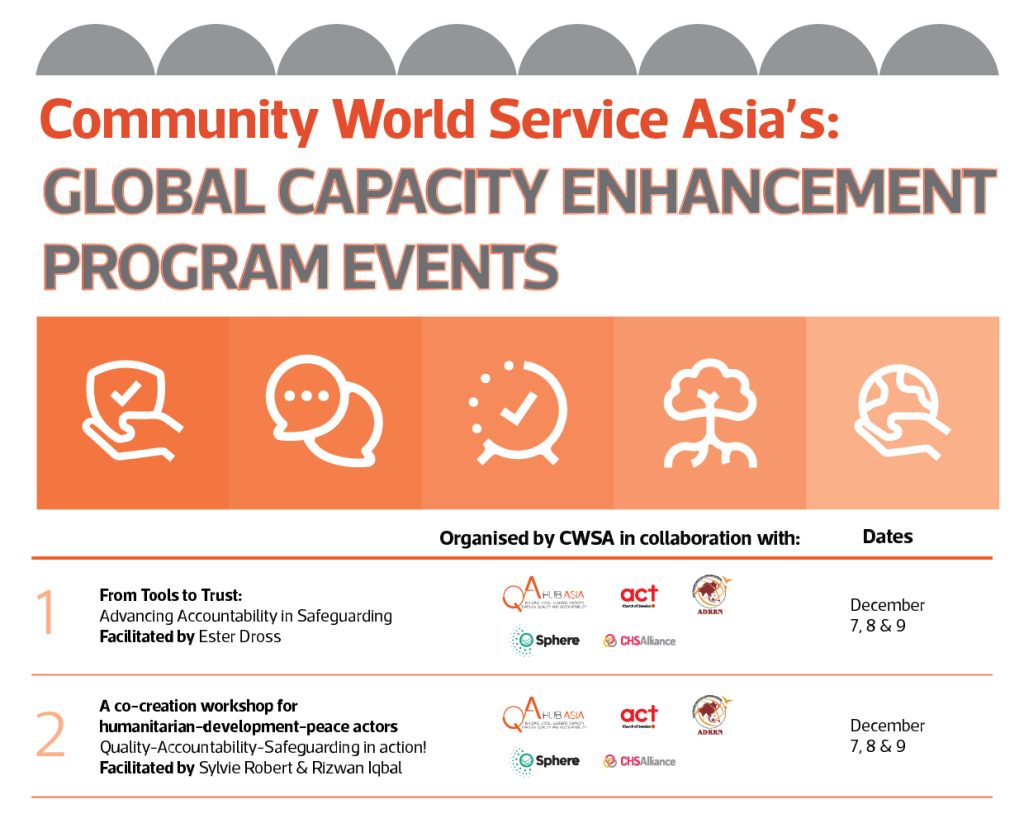
Save the Date: CWSA’s Annual Global Capacity Enhancement Events – December 2024!


The Asian Disaster Risk Reduction Network (ADRRN), Community World Service Asia (CWSA), International Council of Voluntary Agencies ( ICVA), the United Nations Office for the Coordination of Humanitarian Affairs (UNOCHA), are collectively planning a Regional Humanitarian Partnership Week (RHPW) 2022, which will primarily be face-to-face, with some hybrid sessions, in Bangkok this December.
Please find here a ‘Save the Date’ announcement for you to plan your participation in this exciting and meaningful week.
Looking forward to welcoming you in Bangkok.
Community World Service Asia invites you to a 5-Day Workshop full of interactive learning experiences focused on Quality, Accountability and Safeguarding in Humanitarian Action from 4th – 8th of December 2022, in Bangkok, Thailand.
Kindly see the document below for more details and registration.
The application deadline for the Regional event is September 15th, 2022.
For more information, contact our Focal Point for this event Zainab Mir @ regional.program@communityworldservice.asia
Share your Feedback on this third Edition: Consultation is opened until 4th December 2019!
This third Edition is opened to a wide audience for consultation through various platforms. We welcome any comments and inputs until 4th December 2019. This Edition will then be finalized, designed and published by the end of 2019.
We would also greatly appreciate any contribution in the format of stories or case studies related to the implementation of Quality and Accountability throughout the Project Cycle Management/ Humanitarian Programme Cycle.
Please share your feedback and contributions to both:
Sylvie Robert, Booklet Author, Independent Consultant
Email: sylvierobertconsulting@yahoo.fr
Shama Mall, Booklet Publisher, Community World Service Asia
Email: shaprograms@communityworldservice.asia
Thank you in advance!
Note: A 3-day Training package on Quality and Accountability for Project Cycle Management – composed of 10 training modules – is being tested and finalized to accompany this publication.
Community World Service Asia, ACT Alliance, OCHA, ICVA, ADRRN, Act Church of Sweden, CHS Alliance, Sphere, and the Q&A Hub are hosting a collaborative event on strengthening accountability to the communities. A revised version of the new and updated booklet on Quality and Accountability for Project Cycle Management (PCM) will be introduced at this event which will be followed by a stimulating panel discussion that will be led by experts on accountability towards affected populations.
Sphere Regional Focal Point, Community World Service Asia organized a theater performance on the Sphere standard #6.3 Food Assistance. Two theater performances were conducted in Ratan Bheel and Mandhal Thakur villages of Umerkot district in Sindh, Pakistan on December 6th! A total of 130 men and women participated in the community-level event.
The play highlighted some challenges faced during the targeting, distribution and delivery processes of food assistance. Perbhat, a local theater group and local partner of CWSA, performed an interactive theater play to highlight the food distribution methods or direct cash/voucher delivery mechanisms that are efficient, equitable, secure, safe, accessible and effective and are in line with the Sphere standards. The play emphasized on the guidelines derived from the Sphere Handbook 2018 that guides the CSOs to use the minimum standards to protect the rights of all groups of society to promote their dignity and ensure their inclusiveness and protection.
Voices of the Community:
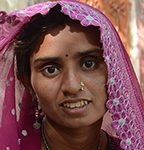 Savetri from Ratan Bheel village in Umerkot shared, “The play promoted the importance and respect of differently able and children in the community. These two groups are mostly overlooked but today we learnt that the new Sphere Handbook promotes the inclusion of all groups including men, women, children, youth and the differently able members of communities.”
Savetri from Ratan Bheel village in Umerkot shared, “The play promoted the importance and respect of differently able and children in the community. These two groups are mostly overlooked but today we learnt that the new Sphere Handbook promotes the inclusion of all groups including men, women, children, youth and the differently able members of communities.”
 Khatoon from Ratan Bheel village in Umerkot quoted, “The needs of men, women, children, youth and differently able members of the communities were given importance. None of the group was disregarded as all are served equally during emergency crisis.”
Khatoon from Ratan Bheel village in Umerkot quoted, “The needs of men, women, children, youth and differently able members of the communities were given importance. None of the group was disregarded as all are served equally during emergency crisis.”
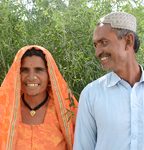 Dhano, Ratan Bheel village, Umerkot. “We learnt an important message today stating that the food assistance provided by various organizations should be according to the needs of community members”
Dhano, Ratan Bheel village, Umerkot. “We learnt an important message today stating that the food assistance provided by various organizations should be according to the needs of community members”
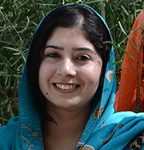 Kiran Bashir, Project Manager, Community World Service Asia. “Sphere Handbook 2018 promotes the inclusion of all women, youth, elders and differently able members of local communities. Every voice counts so let us raise our voices together and share the message of equal participation.”
Kiran Bashir, Project Manager, Community World Service Asia. “Sphere Handbook 2018 promotes the inclusion of all women, youth, elders and differently able members of local communities. Every voice counts so let us raise our voices together and share the message of equal participation.”
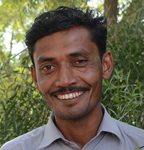 Jai Ram Dhaas, Ratan Bheel village, Umerkot. “We learnt that the Sphere Handbook 2018 caters the needs of all women, children and most importantly of the differently able members in the community who are mostly gone unnoticed.”
Jai Ram Dhaas, Ratan Bheel village, Umerkot. “We learnt that the Sphere Handbook 2018 caters the needs of all women, children and most importantly of the differently able members in the community who are mostly gone unnoticed.”
Article written & developed by the CHS Alliance Communications Team
On 4th & 5th October, the CHS Alliance took part in the 20th Humanitarian Congress in Berlin. Focusing on topical issues such as migration and the safeguarding crisis, participants discussed how to best support crisis-affected people in a polarized political environment.
The Humanitarian Congress Berlin is a forum to analyze and discuss the theory and practice of humanitarian action. Each year, it brings together over 800 leading and emerging experts from around the globe to share experiences and knowledge in an international and multidisciplinary setting. This year the Congress discussed current political trends and their implications for the people at the core of humanitarian work.
Bonaventure Sokpoh, CHS Alliance’s Head of Policy, Advocacy & Learning, and Shama Mall, Deputy Regional Director of Programs and Organizational Development at Community World Service Asia (CWSA) and Board member of the CHS Alliance, both participated in a panel discussion focusing on humanitarian accountability. It was an opportunity for both of the members to advocate for the CHS and the Core Humanitarian Competency Framework.
Currently there are so many different quality and accountability standards available for the sector, and in many cases, they really changed the way we respond to emergencies, but the question remains whether we are doing enough in practice,” Shama said. Specifically, she would like to see changes in organisational behaviours and attitudes to ensure a more meaningful engagement at the community level: “staff should be able to demonstrate accountability in their day-to-day activities.
She believes that change must come from the leadership, who needs to demonstrate accountability on every level and that
. She also warned that, based on her experience, in certain cultures managers find it hard to demonstrate personal accountability or even hold their own team members to account, as people don’t want to get into confrontational situations.staff will follow by example
Another problem is that managers also find it difficult to admit that they have gaps in their programming. I believe that the Core Humanitarian Competency Framework (CHCF) can help achieve these behavioural changes. This framework helps to look at the core competencies that are needed in an organisation to promote a more accountable culture.
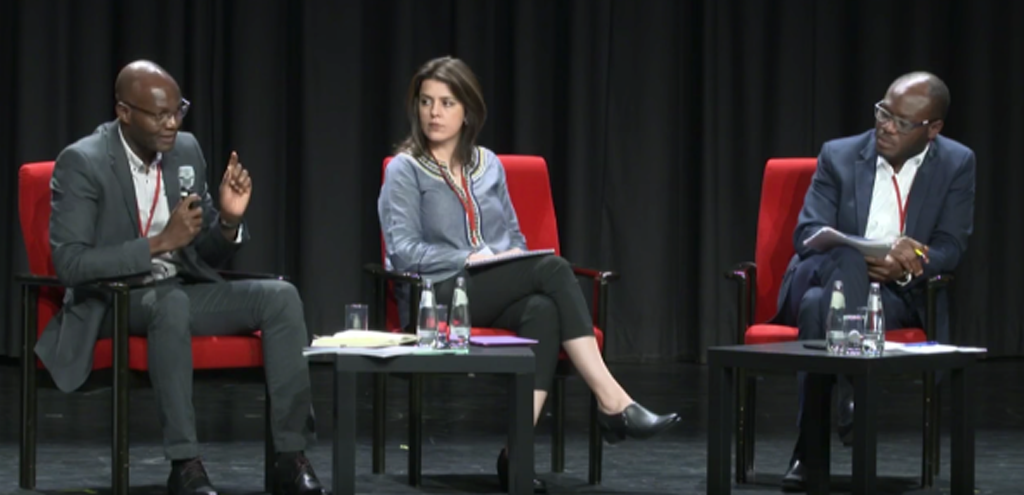
Bonaventure promoted the Alliance’s flagship publication, the Humanitarian Accountability Report (HAR), which was recently launched and examines how change happens in the humanitarian sector.
he said, backing up Shama’s earlier comment.We found that we have sufficient procedures, standards, code of conducts and alike; however, we are struggling with the application of these codes
Real change happens when commitments translate into practice on the ground.
Demonstrating the relevance and usefulness of the CHS Verification Scheme he argued that
The aggregated verification data collected so far shows that the aid sector needs to make progress with regard to its application of Commitment 5 of the CHS (complaints mechanisms), as well as Commitment 4 (communication with communities) and Commitment 7 (learning from experience).once an organisation has been verified against the Core Humanitarian Standard on Quality and Accountability (CHS), we are able to see its strengths and weaknesses, where we need to put our efforts to make further improvements.
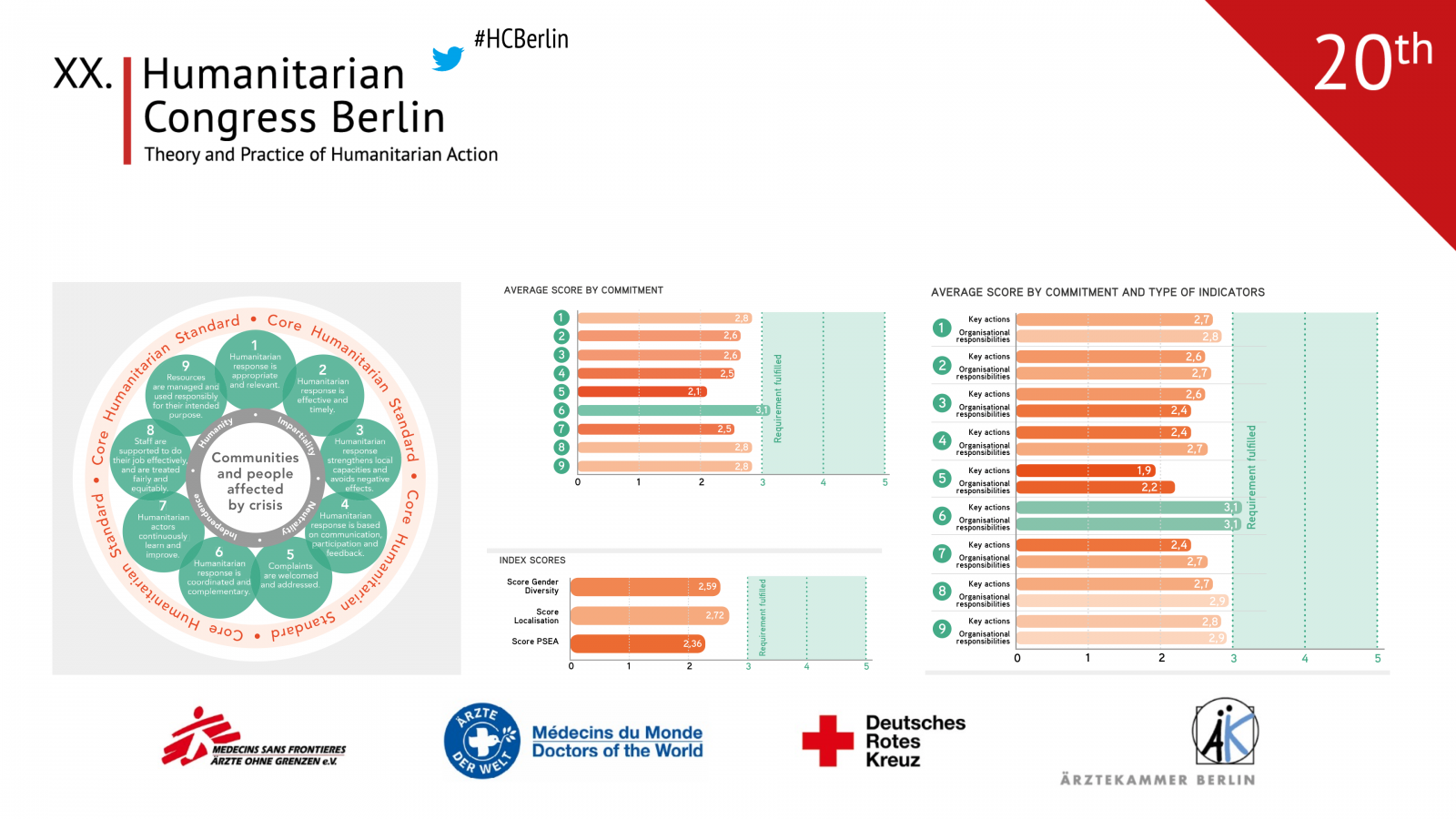
The first results of the perception survey show discrepancies between the perception of aid workers and crisis-affected populations. For example, while aid workers feel confident in their targeting, respondents within the crisis-affected population were much less certain, with only 34% considering that those most in need are reached.It’s good to have the data, but we also need to hear the voices of the affected people, and that’s the reason why we started to work together with Ground Truth Solutions in Chad.